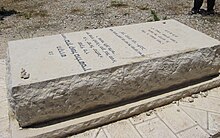Baruch Goldstein
Baruch Kappel Goldstein ( Hebrew ברוך גולדשטיין; ) (Born December 9, 1956 in Brooklyn , New York ; † February 25, 1994 in Hebron ) was a medical officer in the Israeli army and a terrorist . On February 25, 1994 , he carried out an assassination attempt on Muslim Palestinians in the second holiest site in Judaism, the Tomb of the Patriarchs in Hebron , in which 29 people were killed and 150 injured before he was subsequently killed himself.
Life
Goldstein grew up in the United States . He studied medicine at the Albert Einstein College of Medicine and was a member of the Jewish Defense League . Goldstein emigrated from the USA to Israel, lived in the Israeli-occupied West Bank and became a military doctor. Most recently he had the rank of major . He settled in the Jewish settlement Kirjat Arba near Hebron, where he worked as a doctor after his active military service. There is a dispute as to whether he always refused to treat Arabs. Goldstein was also active in the Kach party and was third on their party list for the 1984 Knesset elections. In response to his act, this party was later banned.
Massacre in the Grotto of the Patriarchs
On February 25, 1994, Goldstein entered the Muslim side of the " Cave of Machpelah ", the burial place of Abraham , Isaac and Jacob, in Hebron at 5 o'clock in his uniform with a Galilian assault rifle and four full magazines . The morning prayer was just taking place in Ramadan , the Jews celebrated Purim on this day . He opened fire on the praying Muslim Palestinians from behind . He killed 29 people and injured at least 150; numerous children were among the victims. After his ammunition ran out, Goldstein was overwhelmed by survivors of the massacre and killed with a fire extinguisher. After the fact, riots broke out for several days, in which another 19 Palestinians and 5 Israelis were killed.
The Israeli judiciary formed a commission under the leadership of Meir Shamgar , chairman of the Supreme Court , to investigate the course of events . Among other things, this established that the act was committed by Goldstein alone and that he had not thrown a hand grenade, but also that the border police responsible for guarding were of the opinion that they should never shoot a Jew, even if he was was about to kill Arabs, which was not the case in such a case.
The then Prime Minister Yitzchak Rabin condemned Goldstein's act in front of the Knesset and told Yasser Arafat: “I cannot find any words that are strong enough to express my indignation.” As an Israeli, he was deeply ashamed. The clear majority of Israelis condemned Goldstein's act.
On March 18, 1994, UN resolution 904 was passed, which, among other things, condemned the massacre.
By contrast, followers of the Kach movement and other national religious Jewish fanatics glorified Goldstein's act as “Operation Machpelah” and venerated him as “righteous” (Hebrew: “ tzaddik ”). The controversial Rabbi Yitzchak Ginsburgh publicly praised Goldstein's act and called him a martyr. Ginsburgh's book Baruch ha-gewer has the deliberately ambiguous title Baruch, the man or blessed be the man (meaning / translation of the first name Baruch).
The inscription on his monument erected by his devotees in Hebron read: “Here rests Saint Dr. Baruch Kappel Goldstein, blessed be the memory of this sincere and holy man, may the Lord avenge his blood, who consecrated his soul to the Jews, the Jewish religion and the Jewish land. His hands are innocent and his heart is pure. He was killed as a martyr of God on Adar 14, Purim, in 5754 (1994). ”In 1998, Israel's Minister of Industry and Commerce Ran Cohen introduced a law against this“ memorial ”in the Knesset Israeli military was destroyed. Shortly afterwards, on the 6th anniversary of the crime, Goldstein supporters celebrated a kind of Purim party in costumes such as army uniforms, doctor's coats and fake beards at Goldstein's grave in Kiryat Arba .
In 2010, a memorial event for Goldstein supporters took place in Hebron. The members of the settlement council of Kiryat Arba Benzion Gopstein and Mordechai Sajed praised Goldstein's life and work.
Web links
- BBC: Jewish settler kills 30 at holy site
- Palestine Human Rights Information Center: Details of Hebron Massacre
- SPIEGEL online: In blood and fire
Individual evidence
- ↑ Haaretz : Unlearned lessons ( Memento from 1 October 2007 at the Internet Archive ), November 9, 2006
- ↑ On This Day - February 25 - 1994: Jewish settler kills 30 at holy site. BBC , accessed on April 20, 2010 (English): "Goldstein had been a member of the Jewish Defense League, a violent organization established by Rabbi Meir Kahane."
- ^ Brother against brother: Violence and Extremism in Israeli politics from Altalena to the Rabin assassination by Ehud Sprinzak
- ^ Israel Ministry of Foreign Affairs: Commission of inquiry into the massacre at the Tomb of the Patriarchs in Hebron June 26, 1994
- ^ Text of the Shamgar Commission
- ↑ Nils Metzger: The steadfast settlers of Kiryat Arba. In: Süddeutsche Zeitung . September 20, 2011, accessed September 21, 2011 .
- ↑ BBC : Graveside party celebrates Hebron massacre March 21, 2000
- ^ Settlers Remember Gunman Goldstein; Hebron Riots Continue - Haaretz 2010
| personal data | |
|---|---|
| SURNAME | Goldstein, Baruch |
| ALTERNATIVE NAMES | Goldstein, Baruch Kappel (full name); ברוך גולדשטיין (Hebrew) |
| BRIEF DESCRIPTION | Israeli officer and assassin |
| DATE OF BIRTH | December 9, 1956 |
| PLACE OF BIRTH | Brooklyn , New York City |
| DATE OF DEATH | February 25, 1994 |
| Place of death | Hebron |
